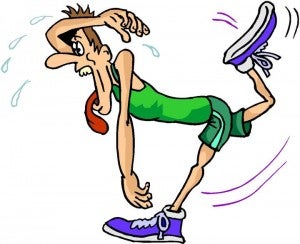Out There: The Burnout Sonnets

There was a line. And I had crossed it big-time.
Written by: Susan Lacke
Shakespeare once wrote, “Can one desire too much of a good thing?”
Obviously, he was talking about training for endurance sports. When The Bard’s wife declared that he was grumpy, irritable, and eating all the gruel in the house, you know he took offense to her suggestion that he scale back on the training. In fury, he adjusted his padded codpiece, threw on his helmet, and took his carbon-fiber bike for a ride to blow off steam. How dareth she say he was training too much?
But ol’ Shakespeare eventually learned the answer to his question: Yes. You really can have too much of a good thing.
Click here for more Out There from Susan Lacke.
For many, the whole point of endurance sports like running, cycling and triathlon is to push the limits of the human body to find out just how far or how hard it can go. Endurance athletes are tough, fit, and have a pain tolerance that would put most sword-swallowing fire walkers to shame. When the body wants to quit, an athlete’s mind will retort with at least a dozen reasons why it simply can’t – and won’t.
Yes, endurance athletes are stubborn creatures. That’s a blessing. And a curse.
Often, we don’t realize we’ve crossed the line until it’s too late. Last year, while training for an Ironman, I fell victim to the so-called logic of “If a little training is good, a lot must be GREAT!” I was in the lovey-dovey infatuation stage of training, where everything was exciting and amazing. I ignored fellow triathletes who warned me of burnout. There was no way that would happen to me, I assured them — the thought of riding my bike for hours on end summoned up butterflies and giddy giggles.
A month before that Ironman, a friend of mine came to my house to join me for a long training ride. He found me in bed, curled up in the fetal position, crying “PLEASE don’t make me get on the bike! PLEASE!”
There was a line. And I had crossed it big-time.
In hindsight, I should’ve seen the burnout coming. I hadn’t been sleeping, even though I was exhausted. My body wasn’t fighting off illness like it normally could. I was a basket case who threw a remote control across the room because I couldn’t get it to work. I was short with the people I loved, especially when they suggested I was training too much and not recovering enough.
That’s right – my friends and family saw it coming. I didn’t.
Athletes will get such intense tunnel vision on preparation for a race that we miss (or ignore) the obvious signs that we’ve crossed the line from “just enough” to “way too much.”
But trust me — your friends and family won’t miss it. Mainly because you’re driving them up a ing wall.
It’s easy for us to get defensive when we’re called out, especially by someone who may not participate in the sport (what could they possibly know, right?). We dismiss their comments and ride off on our high horse (which may or may not be equipped with aerobars). But even if your loved ones don’t participate in your sport, give them some credit for their ability to notice when you’re overtraining.
If they declare you’ve crossed the line, it’s because you’ve exhibited your particular set of quirks which reveal themselves when you overtrain. Maybe you’re snippy. Perhaps you’ve started to half-ass your other responsibilities (Note: it’s called “folding” the laundry, not “wadding”). You may or may not have teared up during a particularly poignant dog-food commercial.
Once you know you’ve crossed that line, start making your way back. It’s not as easy as it seems, but if you’ve got friends and family who are willing to call you out, chances are they’re probably willing to help rein you back in.
Once you’re back to normal, promise you’ll listen to them next time they think you’re overtraining. Your friends and family want to see you cross that finish line, and if you’re smart about avoiding burnout, you’ll do it.
It’s like Shakespeare said after he apologized to his wife and then went on to win the East Vienna Marathon:
“All’s well that ends well.”